June 18, 2025 | 00:28 GMT +7
June 18, 2025 | 00:28 GMT +7
Hotline: 0913.378.918
June 18, 2025 | 00:28 GMT +7
Hotline: 0913.378.918
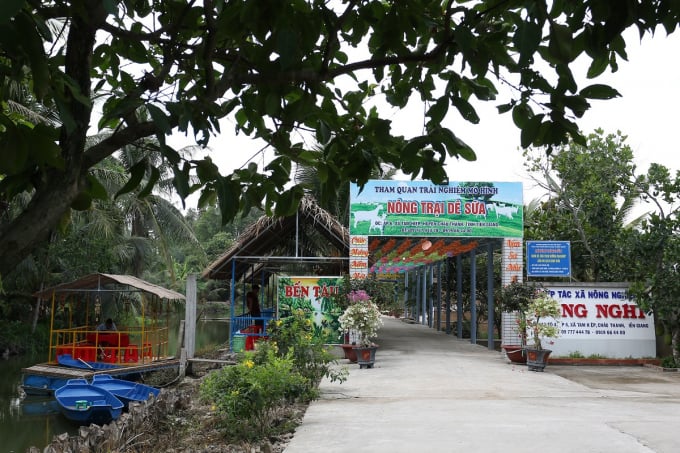
Dong Nghi Agricultural Cooperative has achieved a breakthrough in the way of doing business that helps boost operation efficiency. Photo: Minh Dam.
Located at No. 124, hamlet 6, Tam Hiep commune, Chau Thanh district, Tien Giang province, Dong Nghi Agricultural Cooperative (DNAC) which used to raise goats for meat, has boldly changed to raise goats for milk after a time of studying and researching the nutritional value of goat milk and the market demands.
Starting a business with 10 Saanen dairy goats originating from Switzerland-a popular goat breed in Europe, the DANC has been carrying out a piloting project on the "local goat breed improvement model" since 2015.
The model focuses on raising and hybridizing Saanen dairy goats that can adapt to local conditions, especially taking advantage of existing diverse food sources such as green grass, leaves, dry straw, bananas, jackfruit and pomelo...
The DANC was established in October 2020 and up to now, it has got 10 members who are provided with breeds, raising techniques, support of industrial feeds, and their fresh milk products are prioritized to be purchased at a stable price.
From the first 10 goat breeds, up to now, through crossbreeding, the cooperative has had nearly 300 dairy goats giving 100-150 liters of milk/day. Besides, it also sells breeds of over 20kg/head at the price of VND300,000-400,000/kg.
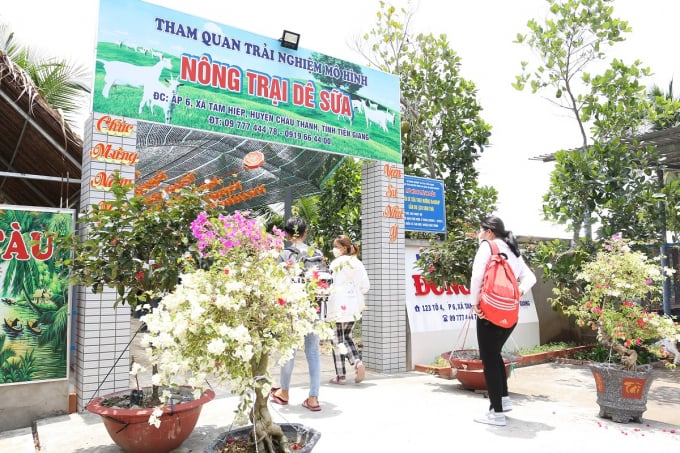
Tourists visit the dairy goat farm of Dong Nghi Cooperative. Photo: Minh Dam.
The cooperative also processes dairy products such as pure fresh goat milk with sugar and no sugar, powdered goat milk and sublimated dried goat milk, fresh goat milk yogurt, and dried goat milk yogurt.
The products have been announced as meeting quality regulations and achieved 3-star OCOP certification.
Besides dairy products, the cooperative develops more frozen-dried fruit products such as jackfruit, durian, etc.
Le Khac Dong Nghi, Director of DNAC said: “Today, consumers prefer new products of natural origin and good for health. With the goal of providing products from clean organic raw materials (organic food) and applying advanced drying technology helping the cooperative create a breakthrough and launch new products with the best quality.”
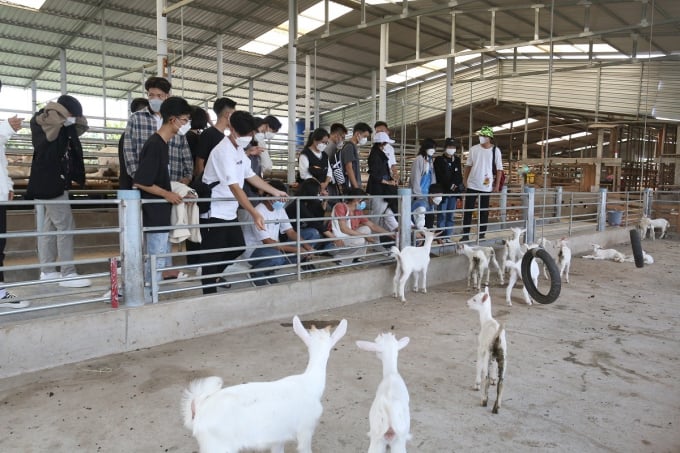
Visitors experience the dairy goat farming model at Dong Nghi Cooperative. Photo: Minh Dam.
The cooperative's dairy products are favored by the domestic market because they have no odor and strictly follow the 3-no principle: no preservatives, no chemical sugars, and no flavor substances. Speaking about the upcoming direction of operation, Ms. Nghi said: "The cooperative will constantly renew techniques and advanced technologies to improve product quality, meet the increasing demands of consumers and introduce products to international markets. It is now targeting the Dubai market and some other countries."
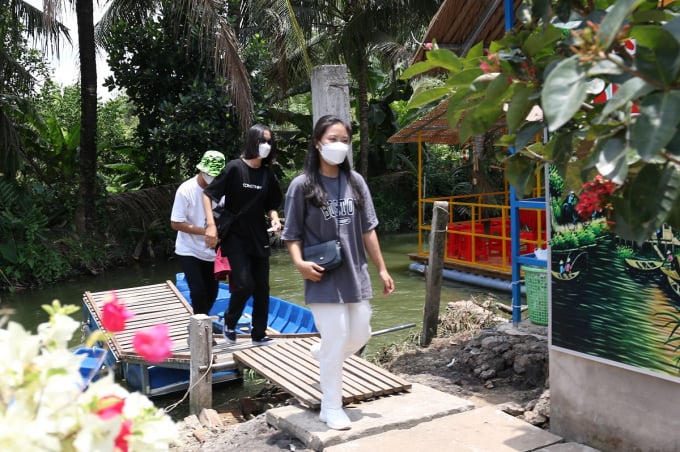
Visitors experience canoeing at the farm. Photo: Minh Dam.
After successes in goat breeding and goat milk production, DNAC has started implementing a new model of agricultural tourism. Locating on an area of more than 25,000m2, the cooperative is divided into 3 areas: a grass-growing area stretching over 20,000m2, a farm with more than 300 Saanen dairy goats, and a resting house that can welcome 500 guests, very convenient for visitors to come to experience farming and enjoy goat milk products.
Coming to Dong Nghi Cooperative, tourists can visit the goat farm and participate in the real works of a farmer such as feeding goats, milking goats by hand or by machine, nursing baby goats, slapping ditches, catching fish, and enjoying dishes made from caught fish, canoeing and dining on the boat...
In addition, they can also enjoy clean fruits grown on the farm such as jackfruit, pomelo and coconut. The entrance ticket to the farm is VND40,000/person. To have a diversified tourism product chain to attract tourists, the cooperative has cooperated with Dien Lan Thon tourist site in the neighboring hamlet 5, Tam Hiep commune.
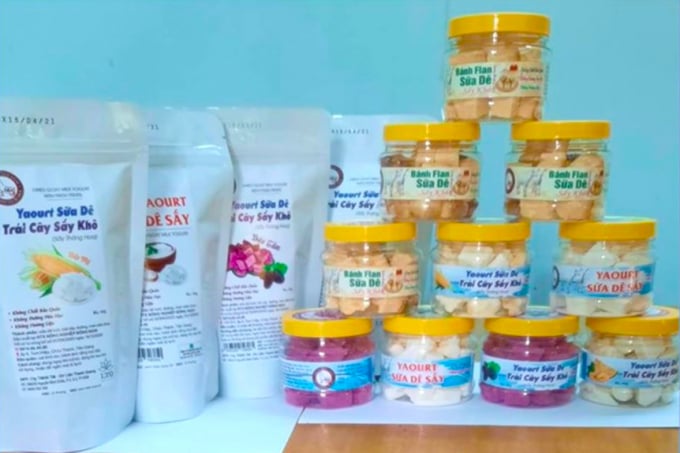
Some goat milk products of Dong Nghi Cooperative. Photo: Minh Dam.
Every week, the farm receives many delegations from inside and outside the province to visit and study. Accompanying students visiting the cooperative, Ms. Nguyen Thi Ca Linh, lecturer at the Faculty of Food Science and Health, from Kien Giang University, said: “The fresh goat milk here has no smell, the sweetness is moderate. The taste is not very different from cow's milk. In particular, when using a spoon, the goat milk yogurt is spun, which is different from the yogurt of cow's milk. Fruit products such as jackfruit and durian are crunchy with moderate sweetness and have retained flavor..."
After nearly 8 years of model transformation with many initial difficulties and challenges such as a lack of capital and difficulties in finding output sources, now, Dong Nghi Cooperative has gradually entered into stable operation, ensuring quality product supply to the market thereby establishing trust in customers. The cooperative currently has many agents and collaborators in many provinces and cities.
"It is expected that in 2022, Dong Nghi Cooperative will sign a cooperation agreement with an exclusive distributor to in domestic markets and for export. The cooperative wishes to get supports in creating output for products to help its members earn stable income and long-term labour. Especially, It want to associate with the tourism and education sectors to promote tourism activities in the area." Ms. Le Khac Dong Nghi said.
Translated by Linh Nguyen
/2025/06/17/3942-2-143243_548.jpg)
(VAN) Recently, in Sweden, the Secretary of the Binh Dinh Provincial Party Committee presented the Investment Registration Certificate for the 'Polyester Fabric Recycling Complex' project to SYRE Impact-AB Company.
/2025/06/12/3721-2-202745_83.jpg)
(VAN) TH made an impression at Seoul Food 2025 with its line of natural beverages, paving the way for Vietnamese food products to enter the South Korean market.

(VAN) Soc Trang's success in rice exports stems from a strategy of developing fragrant and specialty rice cultivation areas and standardizing production toward low-emission practices.
/2025/06/11/1311-5-120811_839.jpg)
(VAN) The pig farming industry is facing the challenge of comprehensive restructuring to meet requirements for quality, safety, traceability, and market expansion both domestically and for export.

(VAN) Vietnam considers participating in ALGROALBA in order to expand agricultural production, coordinate the assessment and effective exploitation potential land.
/2025/06/05/5314-1-184727_407.jpg)
(VAN) From seemingly worthless fish scales and skin, enzymes and lactic ferments can transform by-products into peptides, opening a sustainable, effective business direction and elevating Vietnamese seafood.

(VAN) TTC AgriS and IFC signed a strategic partnership to develop a sustainable agricultural value chain, aiming to achieve the Net Zero target by 2035.